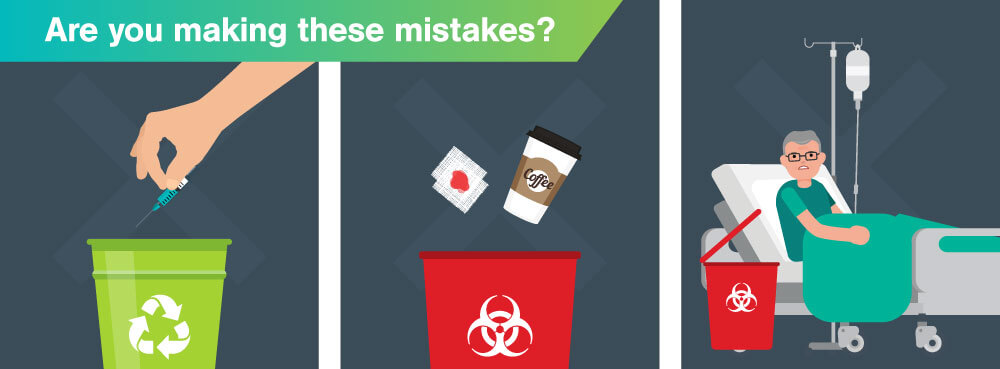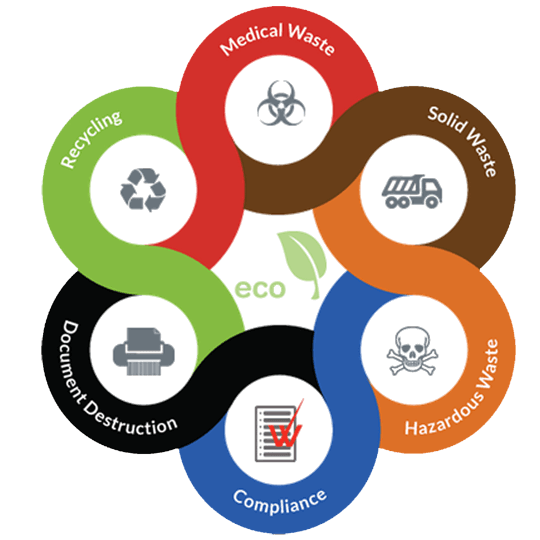Professional Medical Waste Disposal Service: Securing Your Center and Area
Efficient Approaches of Medical Waste Disposal
Efficient approaches of clinical waste disposal are critical in preserving public wellness and environmental security. Clinical waste, including sharps, pathological waste, and pharmaceutical waste, need to be dealt with and dealt with effectively to avoid the spread of infections and shield the setting. This calls for adherence to strict regulations and the implementation of expert waste administration techniques.
Proper segregation of medical waste, safe and risk-free storage space, efficient therapy and disinfection methods, and environmentally-friendly disposal choices are essential parts of a reliable clinical garbage disposal system. Expert waste administration services play a crucial function in making sure conformity with policies and lessening the dangers related to incorrect disposal. By utilizing these techniques, medical care facilities can contribute to a safer and cleaner setting while guarding the wellness of the neighborhood.
Proper Partition of Clinical Waste
Appropriate segregation of medical waste is vital for guaranteeing the safe and efficient disposal of these potentially harmful products. Clinical waste describes any kind of waste created throughout health care activities, such as medical facilities, clinics, laboratories, and study centers. It includes a variety of materials, such as made use of needles, syringes, polluted dressings, expired or extra medications, and organic products.
By setting apart medical waste, health care facilities can decrease the risk of infections, injuries, and environmental contamination. The procedure involves classifying waste into different kinds, such as sharps, contagious waste, pharmaceutical waste, and non-hazardous waste. Each type needs specific handling, product packaging, and disposal methods to stop exposure to medical care workers, waste monitoring workers, and the basic public.
To make certain proper partition, healthcare centers must develop clear standards and provide adequate training to employee. This includes enlightening employees on the different waste categories, appropriate product packaging techniques, and making use of suitable containers - WasteX Medical Waste Disposal. Furthermore, clear signage and color-coding systems can be implemented to promote the identification and segregation of different waste types
Safe and Secure Storage of Medical Waste
Safe and safe storage space of clinical waste is important for preserving the honesty and control of possibly unsafe products. Proper storage not just shields healthcare workers and the public from direct exposure to unsafe materials but likewise stops ecological contamination.
To ensure safe storage, medical centers ought to abide by specific standards. First of all, waste must be stored in leak-proof and puncture-resistant containers that are classified appropriately. These containers need to be snugly secured to avoid any kind of leak or spills. Furthermore, the storage space area should be protected and hard to reach to unapproved personnel, decreasing the danger of unintentional direct exposure.
Proper segregation of medical waste is additionally essential for risk-free storage space. Various sorts of waste, such as sharps, transmittable materials, and pharmaceutical waste, ought to be divided to stop cross-contamination. This partition can be accomplished via the use of color-coded containers or containers.
Regular tracking and evaluation of the storage space area are essential to identify any kind of possible threats or breaches. This includes checking for signs of damages or deterioration in the containers, making certain appropriate air flow, and checking temperature and humidity degrees.
Effective Treatment and Sanitation Approaches

One generally made use of therapy technique is autoclaving, which involves subjecting the waste to high-pressure steam at temperatures above 121 levels Celsius. An additional technique is incineration, which includes burning the waste at high temperatures.
Chemical disinfection is another effective technique for treating medical waste. This technique includes utilizing anti-bacterials such as chlorine compounds, phenolic substances, or hydrogen peroxide to kill or suspend virus (WasteX Medical Waste Disposal). Chemical disinfection is frequently utilized for liquid waste, such as research laboratory samples or physical liquids
Over the last few years, alternate therapy approaches such as microwave disinfection, irradiation, and biological therapy have additionally obtained interest. These techniques offer benefits such as decreased environmental impact and energy consumption compared to standard techniques.
Environmentally-friendly Disposal Options
In the world of medical garbage disposal, thinking about environmentally-friendly options is critical. Healthcare facilities generate a substantial quantity of waste, including contagious products, drugs, and chemicals, which can position severe dangers to human health and wellness and the setting otherwise taken care of correctly. Fortunately, there are a number of environmentally-friendly disposal alternatives offered that can aid reduce these dangers.
Recycling medical waste entails setting apart and refining certain materials for reuse or repurposing. Furthermore, some health care centers have actually carried out reusing programs for specific clinical tools or devices, more lowering waste generation.
An additional environmentally-friendly disposal alternative is waste-to-energy conversion. This technique entails transforming clinical waste into power via procedures like incineration or anaerobic food digestion. medical waste disposal service. Incineration, when done effectively with innovative modern technologies, can create power while lessening unsafe exhausts. Anaerobic food digestion, on the various other hand, breaks down natural waste in the lack of oxygen, creating biogas that can be used for electricity or warm generation.

Benefits of Expert Waste Monitoring Services
One substantial benefit of expert waste management solutions is the boosted effectiveness in taking care of and disposing of medical waste. By using specialist waste administration services, healthcare facilities can make certain that all medical waste is taken care of and disposed of correctly, reducing the threat of contamination and the spread of illness.
Expert waste monitoring solutions employ experienced and qualified personnel who are experienced about the laws and guidelines for medical waste disposal. They have access to specialized tools and tools that allow them to take care of different kinds of clinical waste securely and successfully. These solutions additionally have well-established procedures and protocols in position to make sure that waste is set apart, packaged, moved, and disposed of in compliance with neighborhood, state, and government regulations.
Moreover, professional waste administration services can supply healthcare centers with extensive waste monitoring remedies. They can use services such as waste collection, disposal, transportation, and treatment, tailored to the specific needs and needs of the facility. This gets rid of the burden of taking care of waste inside, permitting health care personnel to focus on supplying high quality person care.
Conclusion
In final thought, effective techniques of clinical visit our website waste disposal include appropriate partition, risk-free storage, treatment and disinfection, and environmentally-friendly disposal alternatives. These methods make certain the safe handling and management of medical waste, preventing the spread of infections and protecting the setting.
Clinical waste, consisting of sharps, pathological waste, and pharmaceutical waste, have to be taken care of and disposed of properly to prevent the spread of infections and protect the atmosphere.Proper segregation of medical waste, safe and secure and risk-free storage space, efficient therapy and disinfection approaches, and environmentally-friendly disposal alternatives are vital elements of an effective medical waste disposal system. The procedure includes classifying waste into various kinds, such as sharps, contagious waste, pharmaceutical waste, and non-hazardous waste. By utilizing professional waste administration services, healthcare centers can guarantee that all medical waste is dealt with and disposed of properly, reducing the risk of contamination and the spread of diseases.
Specialist waste management services use seasoned and skilled workers that are educated about the laws and standards for medical waste disposal.